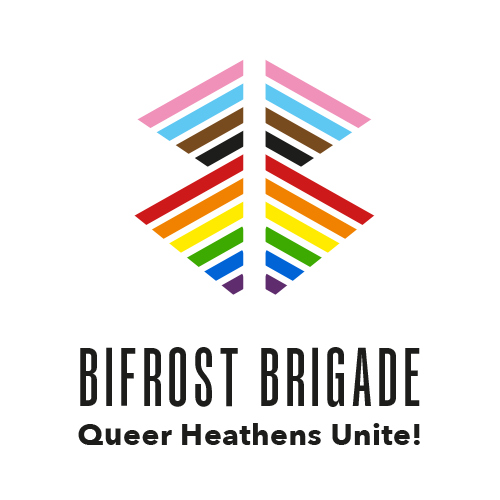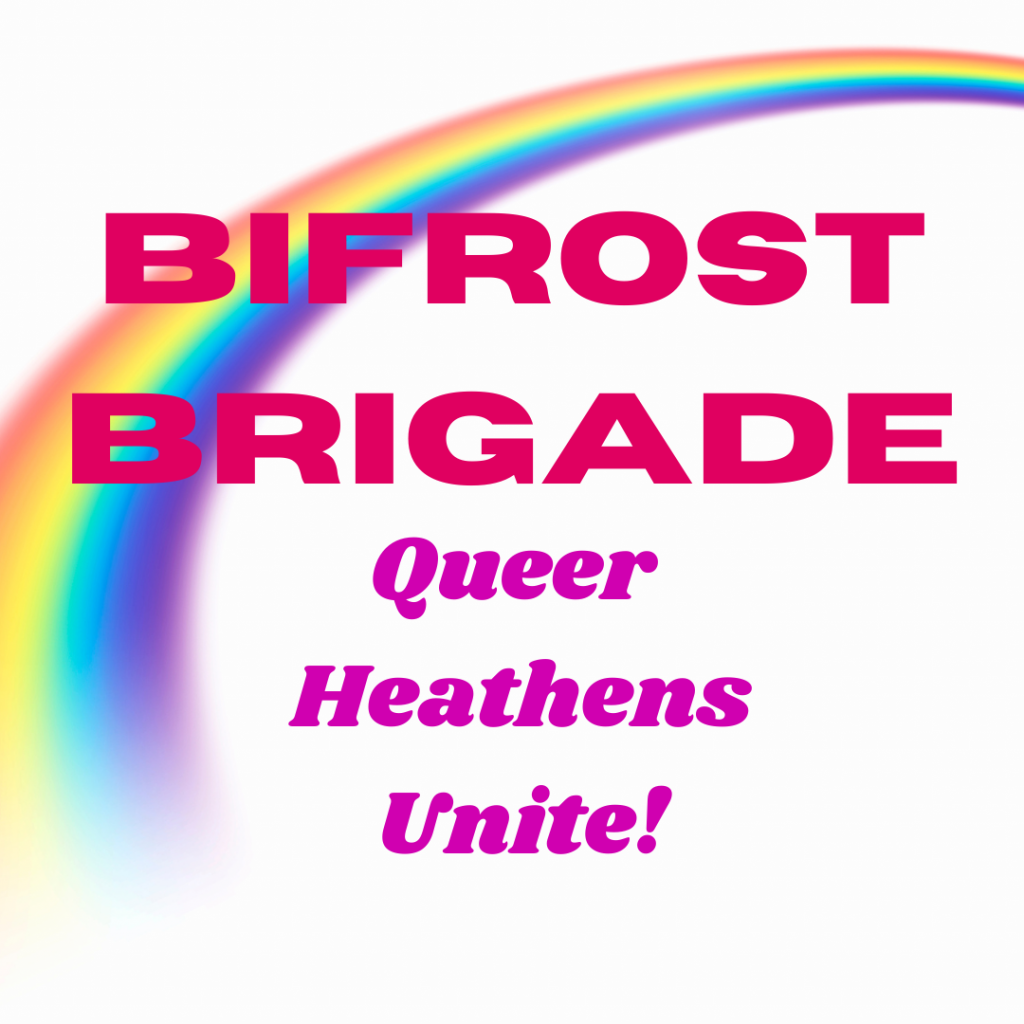
For many years now, I’ve joke about creating an organization for LGBTQIA2S+ Heathens called the Bifrost Brigade. At the start of Pride Month this year, i decided to push the idea even further by creating a poorly designed image using Canva:

I posted my image to Threads and and BlueSky and Melamint, a fellow Heathen with a background in design, saw it over on BlueSky and fell in love with the concept. So she took it upon herself to create a much better logo for it. The latest version of that logo (well, the one on a white background) appears at the top of this post. She was kind enough to release the image under a creative commons license (CC BY-NC 4.0), enabling me and others to use it more or less freely. (Just seriously, make sure you acknowledge her as the creator of the original source image(s). We need to honor our artists in this community.)
So I guess this means I actually need to do something with the Bifrost Brigade rather than just joking about it every so often! After all, the logo above (Melamint’s, not mine) is just too good not to use. The thing is, I don’t think I’m the right person to try to set up an actual organization.
But I think I just might be able to name and spawn a movement. So I invite you to join the Bifrost Brigade, a budding (or perhaps merely rebranded in some people’s cases) movement of LGBTQIAS+ Heathens and Norse Pagans who see our sexuality and gender expressions as an integral part of our lives and something honoring to the Aesir and Vanir.
So who can consider themselves a part of the Bifrost Brigade. There are just a few simple requirements:
- Be a Heathen or Norse Pagan, or honor or work with one or more of the Aesir and/or Vanir.
- Have a sexual orientation and/or gender identity that challenges cisheteronormativity. (Allies/supporters are welcome, but asked not to center themselves.)
- Be committed to a vision of Heathenism and Paganism in that is inclusive general. (Translation: White Supremacists of any degree or flavor are not welcome.)
Why “Bifrost Brigade?”
As I said, the name (and the idea) started out as a joke in my part. It was an alliterative allusion to the rainbow bridge leading to Asgard, home of the gods I hold dear. The dual meaning that the Bifrost was also the rainbow that represented LGBTQIA2S+ pride.
The more I’ve thought about it, the more the imagery has appealed to me. As I wrote on social media, the thought of LGBTQIA2S+ Heathns gathering around the path leading to the home of our deities and owning the implied relationship with them draws me in. We draw closer to them because they embrace us and consider us family. (Heck, Loki is one of us! And I suspect he’s not the only one!)
The rest of this post is my attempt to get out what I consider the important thoughts about my vision for this movement.
My thoughts about the logo
I had no input on the design for the logo. Melamint took my bare bones idea and decided to use the colors of the Progressive Pride flag to create the impression of two Berkana runes back-to-back. However, i fell in love with her design almost as soon as I saw it.
I’ve seen some LGBTQIA2S+ Heathens with other common Heathen symbols in rainbow colors. The two most common ones I’ve seen are Thor’s hammer and the valknut.1 But I’m neither a Thorsman nor an Odinsman and i don’t feel particularly connected to symbols dedicated to either of those gods specifically. It’s part of the reason i went with “Bifrost Brigade,” as Bifrost leads to the realm of all the Norse deities rather than one particular deitiy. And I feel the use of the Berkano rune in the logo casts that same wide net. Sure, while certain goddesses may have a special connection with that particular rune, I feel the principles/mysteries embodied by Berkano can be foudn in all the Aesir and Vanir.
Commitment to embracing pluralism society
There are many LGBTQIA2S+ organizations out there. I think the vast majority of them use a rainbow pentagram/pentacle as their preferred symbol. I don’t connect to that symbol any more than I do the valknut or Thor’s hammer, so it never really worked for me as pride symbol, either. Plus, I wanted something that especially focused on embracing LGBTQIA2S+ people in a more Heathen context. I suspect I’m not the only one, so that’s what the Bifrost Brigade (at least as I envision it) seeks to do.
Having said that, I’m also a strong proponent of pluralism. All humans are human and all LGBTQIA2S+ people are LGBTQIA2S+ people, regardless of whatever their spiritual practices may be (assuming they have any at all). Furthermore, I think that we are stronger together. So while I see the Bifrost Brigade as being a “Heathen flavored” celebration of LGBTQIA2S+ identities and pride, I want to recognize and express solidarity and collaboration with other expressions of those identities and pride as well. We are well past the days when isolationism is healthy or safe.
Relatedly, I’m not inclined to turn away those who honor or work with deities outside of the Norse pantheon(s). For example, I would personally welcome anyone who draws on Freyja to celebrate and honor their sexuality, regardless of the fact that they might also call on Athena or Aphrodite. The Aesir and Vanir are not jealous deities and I do not believe they care who else you honor as long as it does not interfere with keeping whatever commitments you’ve made to them.2
Commitment to radical inclusion and opposition to bigotry
One of the things that frustrates me the most about the LGBTQIA2S+ community is the fact that there’s often prejudice and bigotry within our own ranks. We often can’t even avoid being prejudiced against one other! I’ve encountered misogynystic gay men, transphobic LGB people, and gay men and lesbians who engage in bi-erasure and other forms of biphobia. And a lot of us tend to forget about or even pathologize aro-ace people.
I don’t get it. We all just want to be accepted for who we are. Well, part of that involves accepting others for who they are as well. After all, at some point we have to be honest about whether we really want to end oppression everywhere or just earn our own seat at the oppressors’ table and let others go on suffering.
My vision for the Bifrost Brigade seeks to do the former. So as far as I’m concerned, no bigotry or prejudice has any place in the movement.
I want to specifically address the issue of racism and “folkism” here, as that’s often a hot topic in many Heathen circles. To make it clear, I am a firm believer that the Aesir and Vanir will call who they choose to call to them, regardless of race, heritage, or any other factor. And who am I to question that?3
So if you can’t agree wholeheartedly with the Declaration of Deeds4 or feel the need to add some sort of caveat or qualification to it, you’re almost certainly not aligned with the Bifrost Brigade as I envision it.
The use of the word “Queer”
The logo(s) above include the tagline “Queer Heathens Unite!” I understand that the word “queer” has a complicated history and it makes some people within our community uncomfortable. I chose to use it in my original image because it’s shorter (and catchier IMO) than “LGBTQIA2S+ Heathens.” Also, I came out in the late nineties, when many people in the community were reclaiming and embracing the word “queer.”5 So I tend to like the word.
If the word makes you uncomfortable, you have a couple options:
- You can use one of the many versions of the logo Melamint created that don’t include that tagline.
- You can create your own derivative work based on one of Melamint’s images. (just make sure you follow the conditions for attribution defined in the license.)
Personally, I hope many people go with a version of the logo that includes “Queers unite” because I think we desperately need to unite at this moment in history. But I also respect people’s individual choices to navigate their own feelings about the phrasing.
Concluding remarks
So there you have it. And to those who feel called, welcome to the Bifrost Brigade. Let us gather at the rainbow bridge and ascend to the home of the Aesir and and Vanir. Let us celebrate the frith we share with them, fully embraced as our authentic selves.
Footnotes
- I’d like to note that I’m not actually endorsing the artists whose merchandise I’ve linked to here. In fact, I’m nervous because I know nothing about either of them and accidentally supporting someone who turns out to be bigoted or exclusionary in other ways is always a worry for me. But a quick google search didn’t turn up links to either image/symbol in rainbow colors that weren’t also merch. But bear in mind that the links there are for reference to the symbols I mentioned only. If you decide to buy either item, let the buyer beware. ↩︎
- Indeed, I’ll note I’ve had a couple fleeting flirtations with Pan myself. However, I definitely belong to Freyja. For me, she always comes (tee hee) first. ↩︎
- As close I am to Freyja, I cannot begin to fathom how hard she’d laugh at me or how hard she’d kick my ass if I challenged her right to call someone as one of her devotees. ↩︎
- Declaration 127, currently under the stewardship of The Troth, is another good example of the principles I’m going for here. ↩︎
- The decade I came out was the decade that the organization Queer Nation made a splash with their famous slogan: “We’re here. We’re queer. Get used to it.” Of course, by the time I came out, people were also throwing out humorous variants like “We’re here. We’re queer. Let’s go shopping!” ↩︎
